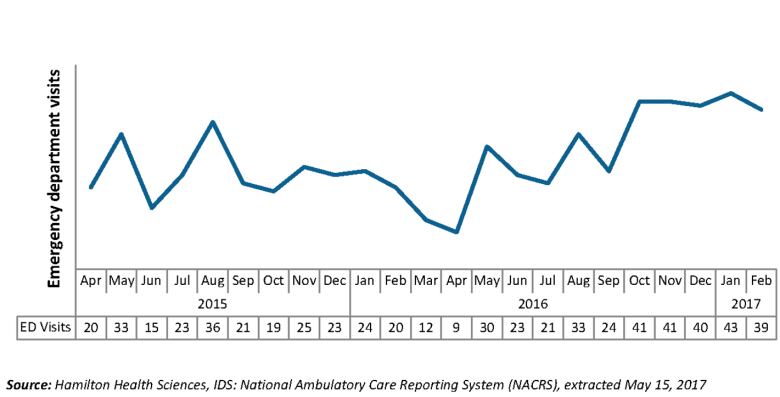ER opioid overdose visits rise in Hamilton, while deaths mount

New data from the city shows that emergency room visits in Hamilton for opioid overdoses have nearly doubled compared to last year.
The local public health unit is watching that jump, and trying to figure out if thatmeans more people are actually overdosing, or if increased awareness is just getting more people into the hospital.
Meanwhile,people in Hamilton are dying from opioid overdosesat a rate of four a month as thedrug epidemic clutches the entire country. There were24 opioidoverdose deaths in Hamilton in the first half of last year alone, the latest period for which those numbers are available.
"It's definitely something that we're watching," said Dr. Jessica Hopkins, associate medical officer of health.
- 911 opioid overdose calls spike in Hamilton in March
- 'It's everywhere': A former opioid dealer says Hamilton is full of fentanyl
Emergency department visits started rising in October of 2016. While there were peaks and valleys in those numbers over the course of 2015,since then they have been staying high at around 40 a month, and not dropping back down. By comparison, there were only 24 emergency room visits for overdoses last September.
Hopkins told CBC News that the source of the rise could be a few different factors, but it's difficult to say exactly.
It could simply be more people overdosing in Hamilton. But the city has also been actively working on a campaign imploring people to seek medical attention if they or someone around them overdoses, which could drive up the numbers, she said.
"It may actually be a good thing in that more people are getting the medical attention that they need," she said.

It's also difficult to critically analyze the data because the city doesn't have numbers for these issues stretching back over several years.
"We don't have years and years of data to see if there's a seasonality, or something like that," she said.
The lak of up-to-date data on opioid abuse has been a major sticking point for advocates, who say that it's a necessity to fight the problem in an informed way.
Just today, the Big-City Mayors' Caucus released a report on the opioid crisis, calling for a standardized, pan-Canadian format for the collection of death and non-fatal overdose data, with, atminimum, quarterly public reports but with monthly reports the preferred target.
This week, Public Health Ontario released a new online opioid tracking tool, which Minister of Health and Long-Term Care Dr. Eric Hoskins says is part of the province's "commitment to openness and transparency."
The tool shows that in the first six months of 2016 (which is the most up to date data available), 24 people died of opioid overdose in Hamilton. That's on top of 45 opioid deaths in 2015 and 37 in 2014.
Those numbers amount to double the amount of deaths the city saw a decade ago, Hopkins said.
"That's significant, because these are all preventable deaths."
The city is currently studying the feasibility of a supervised injection site in Hamilton. The federal government recently overhauled the guidelines for cities applying for these sites, making it easier for municipalities to apply.
Hopkins says public health's report on the possibility of a supervised injection site in Hamilton will go before the board of health by the end of this year.













_(720p).jpg)


 OFFICIAL HD MUSIC VIDEO.jpg)
.jpg)



























































































